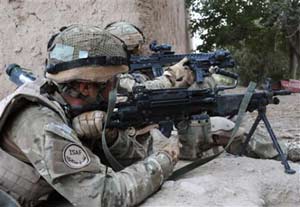|
 British soldiers from Somme Company providing security as Afghan National Army troops search compounds near the town of Sayedebad, Afghanistan, on day three of their operation named TOR SHEZADA, 1 Aug 2010 |
This is Operation Tor Shazada, the biggest offensive of the summer for British troops. They are joined by hundreds of Afghan soldiers, trying to clear insurgents from the town of Sayedebad in Helmand Province.
Coalition forces say it is a stronghold for the Taliban, where they make many of the Improvised Explosive Devices that are a daily hazard for the troops and local Afghans. Captain Brad Pino is the British Platoon Commander.
"The guys are building up positions now just in case the insurgents do decide to attack," said Pino. "We are preparing stores such as rations and water so we can keep ourselves sustained and then it will just be patrolling out from the area to see if we can mix with the locals and find the insurgents."
British commanders say this Operation is making good progress, but in Afghanistan as a whole it has been a tough month, and in Britain public opinion-polls indicate public support is falling. Fifteen British servicemen were killed in July.
On a recent trip to India, British Prime Minister David Cameron justified the Afghan war by saying the troops are keeping Britain safe from terrorism.
But Professor Malcolm Chalmers of the Royal United Services Institute says the public is not buying the prime minister's reasoning.
"Both this and the previous government made this 'chain of terror' argument where we have to be in Afghanistan to prevent al-Qaida moving from Pakistan back into Afghanistan because that may prevent future terrorist attacks on the streets of London. That is a complicated and several-staged argument that is not believable by most people in this country," noted Chalmers.
In the southern province of Uruzgan the 2,000-troop Dutch contingent is packing up and pulling out, after the coalition government in the Netherlands collapsed following a long-running dispute over the deployment. Canadian troops will begin withdrawing next year.
Brigadier General Josef Blotz, a spokesman for the NATO force in Afghanistan, known as ISAF, insists the coalition is holding together.
"The overall forces posture of ISAF and of the Afghan security forces as well is increasing, so we do have the necessary force posture," said Blotz.
Even if troop numbers hold up, Professor Chalmers says future public support for the mission depends on progress.
"If we get to the summer of 2011 and people do not feel that we have made real progress, then I do not think there is an appetite here - or an appetite in the United States - to say, 'Well let us have another go and another go.' And just like in Vietnam you can then get a very rapid erosion of public confidence," added Chalmers.
Analysts say it will take major progress against terrorism in Afghanistan to counter the weight of public opinion in Britain and other NATO countries that this is an unwinnable war.
unwinnable: 赢不了的
UK troops may start leaving next year
NATO struggles to build viable police force in Afghanistan
Afghanistan, Iran become issues in British election race
NATO's Afghan strategy taking longer than expected
(来源:VOA 编辑:陈丹妮)
